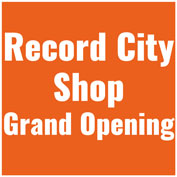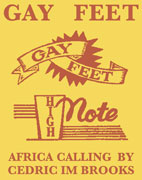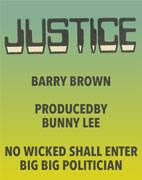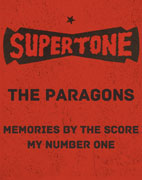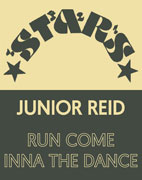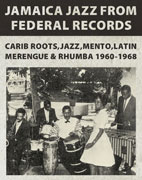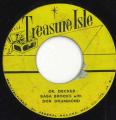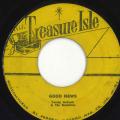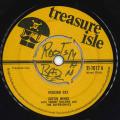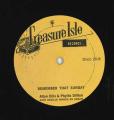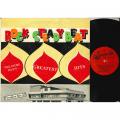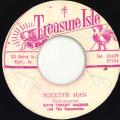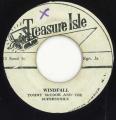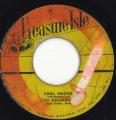Treasure IsleText by Harry Hawks
Treasure Isle was not only the home of some of the best ska, greatest rock steady and groundbreaking reggae but was also the birthplace of the deejay and dub phenomenon.
Treasure Isle
| Place of Establishment | Kingston Jamaica |
| Main Studio(s) | Treasure Isle Studio |
| Founder | Duke Reid |
| Producer(s) | |
| Engineer(s) | Byron 'Baron' / 'Smithy' Smith Errol Brown |
| Related Artist(s) | |
| Related Label(s) |
In 1953, Duke Reid became one of the first independent entrepreneurs to sponsor his own radio show: 'Treasure Isle Time' on R.J.R. which promoted his liquor store, his rum bar and his sound system. Duke Reid's sound overcame all opposition through the weight and clarity of his amplification and his exclusive selection of hard driving American rhythm & blues 78rpm records. He was crowned Kingston's undisputed 'King Of Sound And Blues' in 1956, 1957 & 1958 but, as the decade drew to a close, the audiences in the U.S.A. turned towards a softer, less abrasive music. Kingston's sound system operators now began to make their own rhythm & blues recordings and their custom cut acetate 'reference discs' became so popular that many of them started to be released commercially as vinyl pressings.
Duke Reid's productions from the period were built around the sound of American rhythm & blues but, in 1960, he stepped back from the music business only to return two years later with 'Rough And Tough' credited to 'The Stranger', actually Wilburn Stranger Cole, an unmistakably Jamaican record and a massive hit. The liquor store had relocated to Bond Street where, in 1964, the Duke built his own recording studio on top of the retail premises. The wooden construction of the Treasure Isle Recording Studio gave the recordings warmth and richness and, over the next ten years, endless classic records were produced there with resident engineer Byron 'Baron'/'Smithy' Smith at the controls.
'Tommy McCook & His Ska-talite' made the music for the majority of the Duke's ska recordings and, when The Skatalites broke up in the summer of 1965, Tommy became the leader and musical co-director of the Treasure Isle house band: Tommy McCook & The Supersonics. The Duke came into his own the following year with the arrival of rock steady and the Treasure Isle sound proved to be the elegant epitome of this ice cool music. However, Duke Reid's wildly unorthodox approach to production was often at odds with the relaxed perfection of the final results.
"... If you went in his studio he'd say 'What you come in here for man? You have any business?' And he'd fire a shot over your head so the people did run... so everybody used to be kinda scared of Duke. But Duke would come to you and say 'I want you to do this' and he'd say 'bop bop' and then say 'No! Listen again... be bop boof'. Him say 'Yes!' and they'd say 'Duke it nah go fit the chords' and Duke would say 'Try it... you try it and make I see!' and then he'd fire two more shots. The men got busy! He used to get the best out of them... that's why he had so much hits." Bunny Striker Lee
Towards the end of 1968 the music sped up to the faster reggae style rhythm and a new generation of producers came to the fore. Treasure Isle fought to hold its own against these newcomers and the following year the Duke recruited Lee 'Scratch' Perry(Lee Perry) for 'Lock Jaw' which showcased the seriously underrated singer and deejay Dave Barker. 'Lock Jaw', credited to 'Upsetter' and released on Treasure Isle, was one of the very first records to indicate the direction that would dominate the music for the remainder of the century: dub and deejays.
The stories of either King Tubby or Ruddy Redwood taking out the vocals for special mixes of 'You Don’t Care' or 'On The Beach' to make the first 'version' have been repeated many times. No-one can now be certain as to who really was the first but no-one can argue about the fact that it was a Treasure Isle rhythm that gave birth to the version and, eventually, dub.
King Tubby's Home Town Hi Fi with Ewart 'U Roy' Beckford on the mic. played versions of songs where only snippets of the original lyrics remained. Other Jamaican deejays, including Dennis Alcapone, also started to develop their own individual style of 'toasting' while 'riding the rhythm' and U Roy then transferred the excitement generated in the dance hall to the recording studio. Using some of Treasure Isle's greatest rock steady recordings as their starting point U Roy and the Duke began to make musical history together: their first three seven inch records 'Wake The Town', 'Wear You To The Ball' and 'Rule The Nation' held the top three spots simultaneously in the Jamaican Hit Parade in 1970. These recordings established an entirely new musical form and the 'Version Galore' album which followed proved to be one of the most important records ever made.
"U Roy is not a singer. He plays no musical instruments. He just deejays. Makes the sounds which create excitement when the music goes round. His comments are dubbed on to tapes of versions – instrumental arrangements of tunes." 'Version Galore'
The next critical phase in Jamaica's musical development, Rastafarian influenced rebel music, meant very little to the Duke: always an establishment figure with a great respect for authority the insurrectionist role ran contrary to all that he believed in. He was never a man that could be accused of following fashions and had once refused to allow Dennis AlCapone to record a Rasta lyric telling him:
"Myself, I am Babylon" Duke Reid
Duke Reid died from cancer in 1974 and his nephew, Errol Brown, who had been a junior engineer at Treasure Isle, took over the studio controls. Mrs. Sonia Pottinger of High Note and Gay Feet kept Treasure Isle in the musical spotlight with a comprehensive reissue programme of Duke Reid's music through her Disc Pressers Limited company. The faultless 'Hottest Hits Volumes One & Two' long players, which featured some of the Duke's greatest rock steady recordings, alerted a new generation to the beauty of his Bond Street catalogue. Over the ensuing decades the majority of his music has been made available again on a range of compilations and reissues on a number of different formats.
The understated brilliance of the Treasure Isle rock steady rhythms was the perfect starting point for the musical experiments of the deejays and the dub remixing engineers. This music not only broke the sound barriers but also overthrew countless cultural and artistic preconceptions and the name and the music of Duke Reid will live on forever.
"Duke made his own things and Duke was one of the greatest producers we had. He had his own style and everything". Bunny Striker Lee
Date Added: Jan 28, 2010 / Date Updated: Mar 20, 2014
Copyright (C) 2024 Dub Store Sound Inc.
Related Item(s)
| Baba Brooks, Don Drummond - Dr Decker(Treasure Isle)VG++/SEW/ACI/SLD B:SLOC |
B side) Owen, Leon - I Want My Cock
B side) Owen, Leon - The Fits Is On Me
| Tommy McCook - Persian Cat(Treasure Isle UK)VG+/WOL/LR/stain |
B side) Justin Hinds - Once A Man
| Alton Ellis, Phillis Dillion - Remember That Sunday(Treasure Isle)EX-/SEW/scuff B:stain CVR=VG+/SSD |
B side) Sensations - Those Guys
| Various - Rock Steady Beat : Treasure Isle Greatest Hits(Treasure Isle (Red×Black))LP=EX B:SLD CVR=VG+/SD/HSPSE/WOS |
| Tommy McCook - Soldier Man(Treasure Isle)VG++/SEW/SLD/WOL/stain |
B side) Ethiopians - Mother's Tender Cafe
| Tommy McCook, Supersonics - Windfall(Treasure Isle)VG/SEW/SWOL/stain |
B side) Justin Hinds, Dominoes - Teach The Youth
| Don Drummond - Cool Smoke(Treasure Isle)VG-/SEW/JS |
B side) Techniques - Little Did You Know





